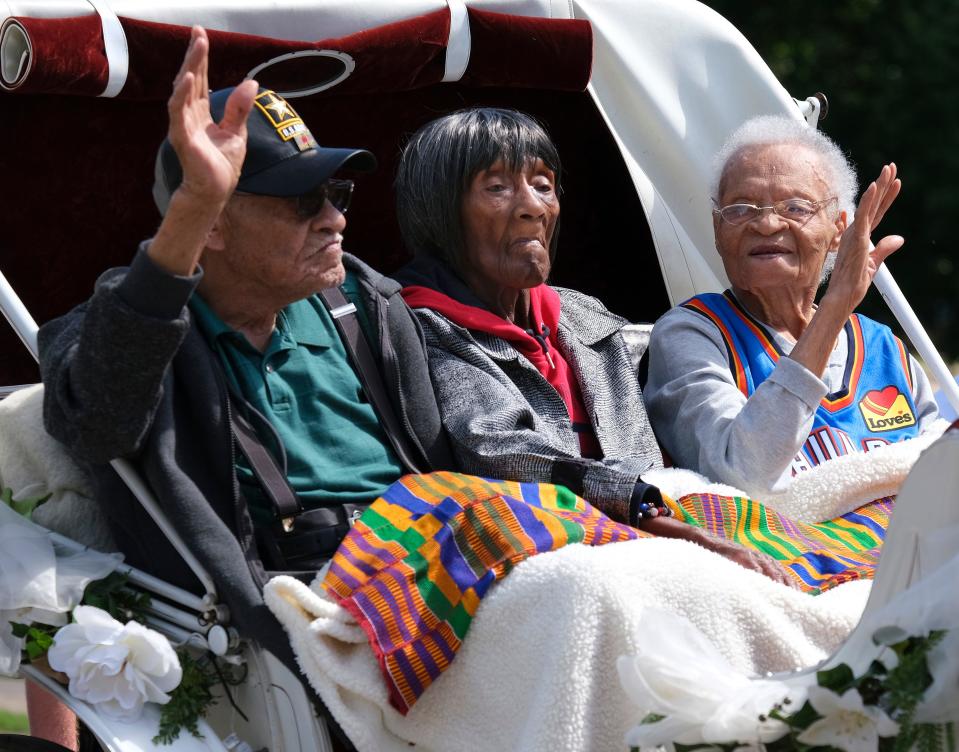Judge dismisses 1921 Tulsa Race Massacre lawsuit seeking restitution
OKLAHOMA CITY – An Oklahoma judge threw out a lawsuit that sought financial restitution for the three remaining survivors of the 1921 Tulsa Race Massacre, effectively ending any further attempts by survivors' attorneys to seek reparations.
Tulsa County District Court Judge Caroline Wall on Friday dismissed with prejudice the lawsuit that was filed against the City of Tulsa and others in an effort to obtain legal justice for the racist attack's survivors and the Black Tulsa community. The survivors, ranging in age from 102 to 109 years old, lived through what some consider one of the worst incidents of domestic terrorism in American history.
Between May 31, 1921, and June 1, 1921, an angry white mob stormed the well-established and prosperous Black community of Greenwood, Tulsa, also known as Black Wall Street. More than 1,000 homes were burned and businesses were looted and left in ruins as 35 city blocks were destroyed.
Although just 39 deaths were listed in official records, estimates now put the number at closer to 300, and thousands more were left homeless.
The lawsuit, which was filed in 2020, stated that the 1921 Tulsa Race Massacre represented an "ongoing public nuisance," to survivors Viola Fletcher, Lessie Benningfield Randle, and Hughes Van Ellis Sr. The lawsuit also said the destruction of what had been America's most prosperous Black business community continues to affect Tulsa.
Wall wrote in her order that she was dismissing the case based on arguments from the city, regional chamber of commerce and other state and local government agencies. When a case is dismissed with prejudice, it acts as a final and permanent dismissal, meaning the case cannot be refiled.
The city has yet to receive the full court order, according to Mayor G.T. Bynum.
“The city remains committed to finding the graves of 1921 Tulsa Race Massacre victims, fostering economic investment in the Greenwood District, educating future generations about the worst event in our community’s history, and building a city where every person has an equal opportunity for a great life,” Bynum said in a statement.
102 years after the Tulsa Race Massacre: Here's where efforts to reconcile and revitalize stand
Lawsuit alleged ongoing nuisance stems from massacre
The lawsuit was brought under Oklahoma’s public nuisance law, claiming Black Tulsa residents remain impacted by the attack today. It alleged that the massacre had rendered the survivors insecure in their lives and property, and "annoyed, injured and endangered the community."
It also alleged that the lack of investment in the Greenwood District and other historically and predominantly Black areas of Tulsa after the massacre had exacerbated the damage and suffering.
The suit contended that the city's long history of racial division and tension are rooted in the massacre, which was perpetrated by members of the Tulsa Police Department, Tulsa County Sheriff's Department, the National Guard, and city and county leaders, among others.
Problems were further compounded when "in 2016, the Defendants began enriching themselves by promoting the site of the Massacre as a tourist attraction," according to the suit.
A Chamber of Commerce attorney previously said that while the massacre was a horrible incident, there was no ongoing nuisance.
Wall initially ruled on the motion to dismiss in August 2022 but plaintiffs filed an amended petition, allowing the case to proceed.

Ruling ends long legal battle
Wall's order ultimately reverted the suit back to last year's decision, stating that the plaintiffs' claims of the defendants creating an ongoing public nuisance should be dismissed with prejudice because they requested "relief that violates the separation of powers provided by the Constitution of the State of Oklahoma."
The decision also said the survivors' attorneys failed to identify a legally cognizable abatement remedy, and that the court was not willing to engage in the management of public policy matters that should be dealt with by legislative and executive branches.
Friday's ruling effectively ends a centurylong legal battle by survivors. The suit against the city came after numerous previous legal attempts at reparations failed.
Because the massacre was originally deemed a riot, the Oklahoma Supreme Court immunized insurance companies from liability in 1926, meaning none of the Black home or business owners could make claims for property loss.
A commission established by the Oklahoma Legislature studied the incident from 1997 to 2001 before recommending reparations, but a federal lawsuit filed in April 2003 was dismissed less than a year later because the statute of limitations had expired.
In her order Friday, Wall wrote the motion to dismiss "should and shall be granted upon the grounds set forth in the defendants' briefs." The order also said the court finds further amendment futile, and "respectfully finds and orders the plaintiffs' second amended petition should and shall be dismissed with prejudice," according to court documents retrieved from the Oklahoma State Courts Network website.
Contributing: The Associated Press
This article originally appeared on USA TODAY NETWORK: Tulsa Race Massacre case: Judge denies restitution for survivors


